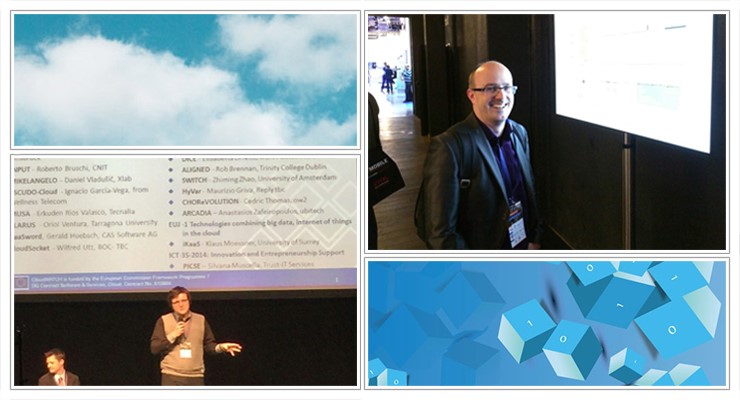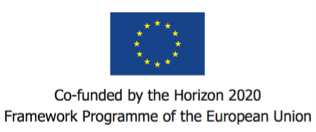XLAB is coordinating the MIKELANGELO project, funded by the European Union’s research and innovation program Horizon 2020. Scientists and engineers participating in MIKELANGELO aim to improve the virtual infrastructure stack, continuously testing and validating their progress with use cases – lightweight aircraft design, use in medicine (implant production) and deployment of big data technology. Enhancing the quality of big data applications is also the focal point of the DICE project, within which an integrated development environment to design new big data applications is being developed. The results of both projects will be beneficent for SMEs both from the financial and technical perspective, resulting in applications that can better manage data, extract insights and reduce costs of rented hardware.
Supercharging the Cloud
Based on market research, the Cloud-based High Performance Computing infrastructure and applications could derive value to smaller and mid-sized businesses. This premise is at the core of the MIKELANGELO project – to enable end users to run HPC applications using the Cloud infrastructure (software and sometimes even hardware) and thereby reduce costs of running HPC applications on supercomputers or clusters of computers as was the conventional approach.
“MIKELANGELO focuses on bridging the key difference between virtualized environments, the Cloud, and its counterpart, the supercomputer – efficiency and speed of I/O (input/output) operations. Thus it will bring the Cloud flexibility to HPC and HPC efficiency and power to the Cloud,” says Gregor Berginc, technical coordinator of MIKELANGELO.
MIKELANGELO is funded by the European Union’s flagship research program, Horizon 2020, and coordinated by XLAB, an SME with experience in Cloud and HPC technologies. It involves a consortium of partners with research and technical expertise in Cloud and virtualized environments from Europe and worldwide; Huawei, IBM, Intel, HLRS, GWDG, Ben Gurion University, Pipistrel and XLAB.
“Having been assigned the coordination of a Horizon 2020 project demonstrates technical as well as organizational ability of the company – administrative tasks at this level are already quite complex,” says Daniel Vladušič, coordinator of MIKELANGELO.
“It also proves that small, specialized research companies utilizing cutting edge technologies are able to compete successfully for EU funding,“ adds Gregor Pipan, CEO at XLAB.
Rapid Prototyping Made Cheaper
Among the use cases that will benefit from more efficient virtual infrastructures and one that spikes most interest is the Slovenian light aircraft manufacturer Pipistrel, who will use HPC Cloud for aircraft design to improve aerodynamic properties early in the process. SMEs such as Pipistrel do not possess sufficient computational resources to run heavy numerical simulations and need to rent them, which presents significant entry barrier. By taking advantage of the MIKELANGELO stack the aeronautical designers will be able to easily run their HPC applications and focus on actual aircraft design with near real time feedback instead of dealing with complex and costly resource allocation procedures required by most HPC centers.
Taking care of the runtime efficiency (MIKELANGELO project), the design aspects in a similar couple of domains are addressed. Namely, in another joint effort exploiting Big Data technologies, XLAB and partners within the European project DICE aim to accelerate the development of business-critical data-intensive applications running on public or private clouds.
Rapidly Implementing Big Data Applications
These applications need to be highly available, scalable and cost-efficient. Implementing complex Big Data application of this kind in a short period of time, however, takes a high level of skill and experience when answering questions like: how to satisfy all the quality requirements? What architecture should the designers adopt, keeping in mind the future evolution of the service? How should the developers accelerate quality testing for this initial release? How to best evolve the application once it gets off the ground? DICE will tackle these challenges by offering an integrated development environment to design new Big Data applications and quality analysis tools to compare possible architectures by predicting their expected reliability, efficiency and safety characteristics.
“DICE is targeted at all who work with vast amounts of data and could benefit from applications that can perform complex analytics and extract insights in a cost-effective and reliable way,“ says Matej Artač, PhD, project manager of DICE at XLAB. “Small and mid-sized enterprises need agile development processes to remain competitive while at the same time they cannot afford dedicated quality engineering teams to deliver high-quality applications.”
DICE project is supported by the European Union’s Horizon 2020 research and innovation program and brings together 9 partners from 7 European countries: Imperial, Politecnico di Milano, IEAT, Flexiant, ATC, Prodevelop, Netfective, Universidad de Zaragoza and XLAB.
More information is available on official MIKELANGELO and DICE websites:
http://www.mikelangelo-project.eu/
Project coordinator, Daniel Vladušič, and technical coordinator, Gregor Berginc, presented the MIKELANGELO project at the NetFutures 2015 conference in Brussels










